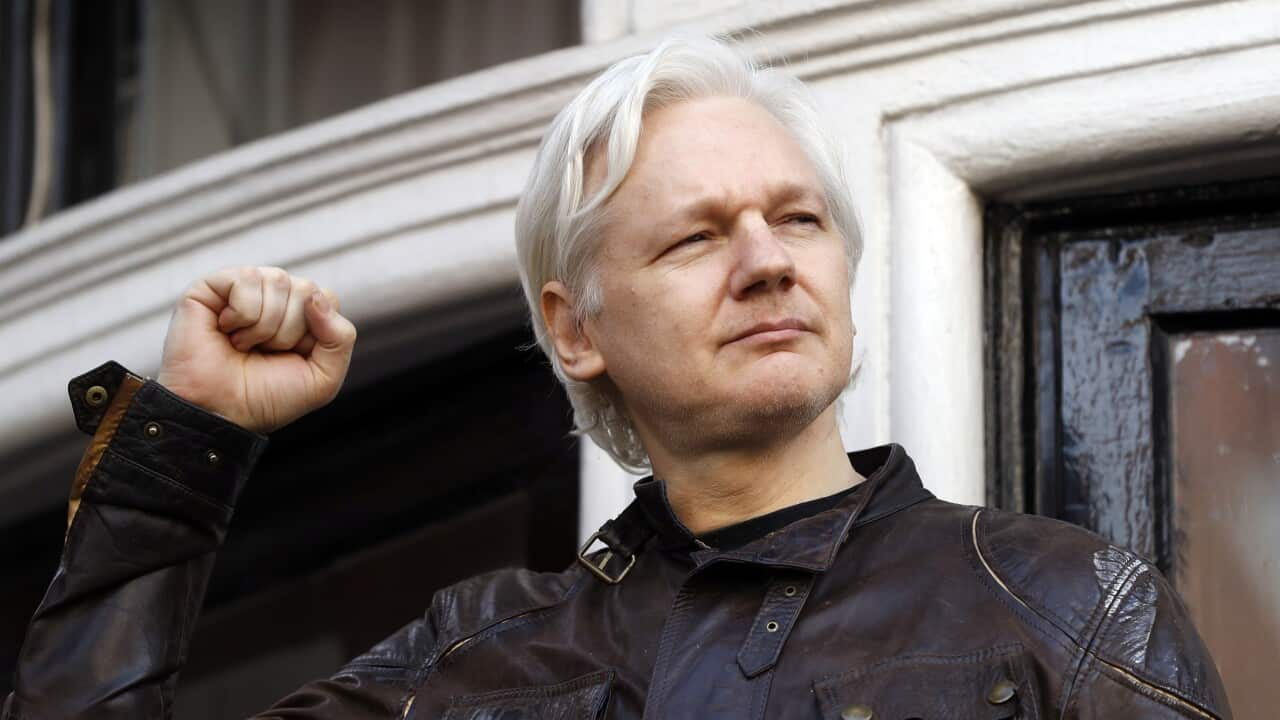Julian Assange has been in some form of confinement — be it holed up or on — the entire time I’ve been a correspondent in London. That’s more than 11 years.
Which meant the news he was on his way to a tiny island in the Pacific came as somewhat of a shock at 6am Tuesday morning.
I didn’t need to read any articles or make any calls to know he’d agreed to a plea deal with the US Department of Justice.
Talks had been underway for months and the Australian government had been pressuring the Biden administration to bring the saga to a close. Finally, this story I’d covered for more than a decade had an ending in sight.
My first encounters with Assange were his balcony appearances at Ecuador’s London embassy, across the road from the famous Harrods department store. In those early days, he would occasionally wander onto the balcony and make lengthy speeches to his adoring supporters below.
In case you’ve forgotten why he was in that building, he was avoiding extradition to Sweden over and molestation, which he denied and feared were a ruse to get him to the United States, where he was wanted over the release of secret military documents.
In August of 2013, I went into the embassy and met Assange, who had agreed to a sit-down interview with my then employer Network Ten’s Meet the Press.
The first thing you noticed was the attitude of the embassy staff. As we carried in camera equipment, they were friendly but appeared tired of the disruption their Australian lodger was causing in a surprisingly small facility designed for issuing visas and assisting Ecuadorians.
Assange was polite, but understandably concerned about his security. It was an unusually hot day, yet the windows remained closed.
The room we were shooting in was packed full of computer servers which we were asked not to film. His worries turned out to be well-placed when it was later revealed the lengths the CIA and private security firms had gone to when monitoring his actions.
There were unexpectedly lighthearted moments. As our cameraman went to change a battery, he tilted the lens to the ground, as is normal. A shoeless Assange thought we were trying to film his very pale (and bare) feet. We assured him his toes would remain his business.
In the years that followed, interest in the case waned. A colleague from a commercial network once told me they no longer covered the Assange story as focus groups had shown their viewers couldn’t care less. It was confusing, seemingly never-ending and the man himself was a divisive figure.
Fast forward to 11 April 2019. I was chatting with colleagues in Westminster when I received a message from a contact suggesting Assange was about to be evicted from the embassy and arrested.
With the Assange case, nothing would happen for months at a time, then everything would happen in minutes.
I raced over to Kensington but was too late; only Russian news agency Ruptly had captured the moment of a bearded, angry Assange being carried down the stairs and into a police van.
So began the next phase of this story. Court hearing after court hearing. I’ve lost track of how many days were spent in court watching Assange in the dock or struggling to hear what was going on via video link.
His main extradition hearing took place at a court next door to Belmarsh prison. The chants of protesters outside and the bemused looks of prisoners being released first thing in the morning made for an interesting few days.
Assange himself thanked his supporters but asked them to keep the noise down as he was having trouble concentrating.
Assange won, then lost, then won. Hearing, appeal, hearing, appeal. On it went for years.
During that time, it emerged Assange , lawyer Stella Moris, but had fathered two children during his time in the embassy.
I was one of the first journalists to sit down with Stella, who had been reluctant to reveal her unorthodox family to the world.
But this was now as much a PR battle as a legal one, and it was clear presenting the WikiLeaks founder as a dad (and later husband) would increase pressure on authorities in the US, Australia and UK to bring the case to a close.
Our first interview was intriguing. Julian rang her mobile while we were recording and asked how it was going.
He need not have been concerned, as she spent more time discussing press freedom and human rights than the details of their romance.
As my cameraman filmed her walking through a garden, her boys Gabriel and Max played with toys at my feet. Both were little versions of their father, one of the most wanted men on the planet.
In the years that followed, Stella would become his . In our most recent interview in February, I asked if her husband would accept a plea deal, given it would require him to admit wrongdoing.
“Julian has done nothing wrong. It’s not just about Julian,” she told me.
“Imagine if there were to be such a deal, the implications for the rest of the press.”
Now, she says her husband will push for a post-conviction pardon from US President Joe Biden. That seems unlikely. But so did the idea he’d be on a plane travelling to a tiny island in the Pacific Ocean.
